
The Tomb of the Unknown Soldier at Arlington National Cemetery in Arlington County, Virginia, United States is the burial site of a World War I soldier there whose remains were unidentifiable.

Arlington National Cemetery is the largest cemetery in the United States National Cemetery System, one of two maintained by the United States Army. Over 400,000 people are buried in its 639 acres in Arlington County, Virginia.
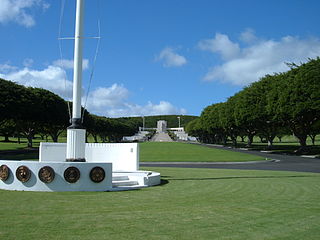
The National Memorial Cemetery of the Pacific is a national cemetery located at Punchbowl Crater in Honolulu, Hawaii. It serves as a memorial to honor those men and women who served in the United States Armed Forces, and those who have been killed in doing so. It is administered by the National Cemetery Administration of the United States Department of Veterans Affairs and is listed on the National Register of Historic Places. Millions of visitors visit the cemetery each year, and it is one of the most popular tourist attractions in Hawaii.
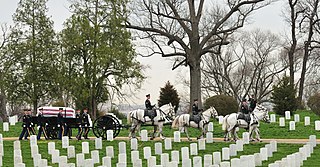
A military funeral is a memorial or burial rite given by a country's military for a soldier, sailor, marine or airman who died in battle, a veteran, or other prominent military figures or heads of state. A military funeral may feature guards of honor, the firing of volley shots as a salute, drumming and other military elements, with a flag draping over the coffin.

Marine Corps Air Station Miramar is a United States Marine Corps installation that is home to the 3rd Marine Aircraft Wing, which is the aviation element of the I Marine Expeditionary Force. It is located in Miramar, a community of San Diego, California, about 14 miles (23 km) north of downtown San Diego.
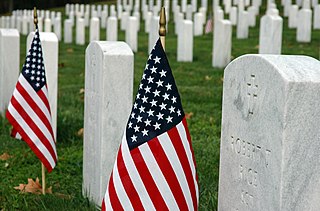
Quantico National Cemetery is a national cemetery in Triangle, Virginia for veterans who served in the United States Armed Forces. Adjacent to and originally part of Marine Corps Base Quantico, it was established as a national cemetery in 1983 with an area of 725 acres (293 ha).
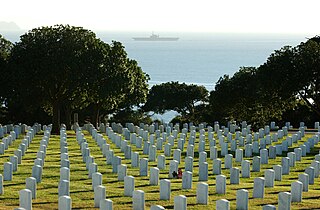
Fort Rosecrans National Cemetery is a federal military cemetery in San Diego, California. It is located on the grounds of the former Army coastal artillery station Fort Rosecrans and is administered by the United States Department of Veterans Affairs. Fort Rosecrans is named after William Starke Rosecrans, a Union general in the American Civil War.

Golden Gate National Cemetery is a United States national cemetery in California, located in the city of San Bruno, 12 miles (20 km) south of San Francisco. Because of the name and location, it is frequently confused with San Francisco National Cemetery, which dates to the 19th century and is in the Presidio of San Francisco, in view of the Golden Gate. Around 1937, San Francisco residents voted to bar the opening of new cemeteries within the city proper and, as a result, the site for the new national cemetery was selected south of the city limits in adjacent San Mateo County.

The United States Naval Academy Cemetery and Columbarium is a cemetery at the United States Naval Academy in Annapolis, Maryland.

Baltimore National Cemetery is a United States National Cemetery located along Maryland Route 144 on both sides of the boundary between the neighborhoods of Beechfield in Baltimore City and Catonsville in Baltimore County. It encompasses 72.2 acres (29.2 ha). As of 2022, the cemetery has nearly 46,000 interments. It was listed on the National Register of Historic Places in 2016.

The Los Angeles National Cemetery is a United States National Cemetery in the Sawtelle unincorporated community of the West Los Angeles neighborhood in Los Angeles County, California.
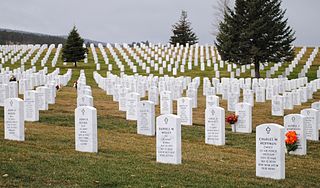
Black Hills National Cemetery, originally named Fort Meade National Cemetery, is a United States National Cemetery near Sturgis, South Dakota. Named after the nearby Black Hills, over 29,000 interments of military veterans and their family members have taken place since its founding in 1948. It is administered by the U.S. Department of Veterans Affairs (VA), which also operates the nearby Fort Meade National Cemetery. It was the first national cemetery in South Dakota and is currently the only one open to new burials.
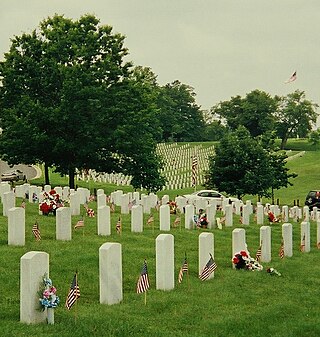
Camp Nelson National Cemetery is a United States National Cemetery located in southern Jessamine County, Kentucky. It was originally a graveyard associated with the U.S. Army's Camp Nelson, which was active during the U.S. Civil War and its aftermath. The camp was named for Major General William "Bull" Nelson, commander of the Civil War Army of Kentucky, who was murdered by a fellow officer in 1862.

Alpha Lyons Bowser was a United States Marine Corps lieutenant general. He was a combat veteran of World War II and the Korean War – decorated for his actions during the Battle of Iwo Jima and in the Battle of Chosin Reservoir.

In the United States, state funerals are the official funerary rites conducted by the federal government in the nation's capital, Washington, D.C., that are offered to a sitting or former president, a president-elect, high government officials and other civilians who have rendered distinguished service to the nation. Administered by the Military District of Washington (MDW), a command unit of the Joint Force Headquarters National Capital Region, state funerals are greatly influenced by protocol, steeped in tradition, and rich in history. However, the overall planning as well as the decision to hold a state funeral, is largely determined by a president and their family.
Greenwood Memorial Park is a cemetery in San Diego County, California. Opened in 1907, Greenwood covers approximately 125 acres (0.51 km2) five miles east of downtown San Diego. It is a rural cemetery, incorporating architecture, art, and landscaping into its design. Greenwood and its accompanying mortuary are now part of NorthStar Memorial Group (NSMP). It is adjacent to Mount Hope Cemetery.

A military funeral in the United States is a memorial or burial rite conducted by the United States Armed Forces for a Soldier, Marine, Sailor, Airman, Guardian or Coast Guardsman who died in battle, a veteran, or other prominent military figures or a president. A military funeral may feature guards of honor, the firing of volley shots as a salute, drumming and other military elements, with a flag draping over the coffin.

The 1959 San Diego F3H crash was the crash of a United States Navy McDonnell F3H-2N Demon in San Diego, California, on 4 December 1959. The pilot, Ensign Albert Joseph Hickman from VF-121, chose not to eject from the stricken aircraft, piloting it away from populated areas of Clairemont, including an elementary school, saving "as many as 700 people" on the ground, according to one estimate. The aircraft crashed into a canyon, with the pilot being the sole fatality. Hickman has been memorialized in the naming of an elementary school and a sports complex in San Diego. Several decades later, a similar crash occurred in University City, a neighborhood north of Clairemont.
Fargo National Cemetery is a 4.8 acre United States Department of Veterans Affairs (VA) national cemetery located in Raymond Township, Cass County, North Dakota. The cemetery serves as the burial needs of more than 30,000 Veterans, their spouses and eligible family members.
Acadia National Cemetery is a 6.2 acre Department of Veteran Affairs (VA) national cemetery located in Washington County, Maine. The cemetery will serve the burial needs of Veterans, their spouses and eligible family members.














































